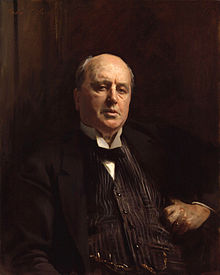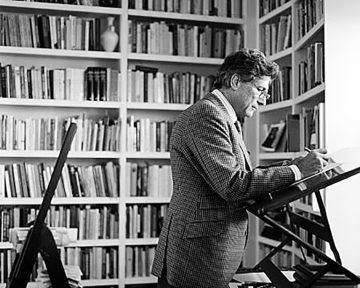by Robert Fay

In 1899 at the age of 59 Henry James began work on The Ambassadors, the first of his brilliant, ground-breaking final three novels that included The Wings of the Dove and finally The Golden Bowl. James’ biographer Leon Edel writes, “The Ambassadors was told by James in a complex, indirect style he had never attempted before…rather than accept the old tradition of the novel which told everything, James allowed his readers to know only as much as one learns in life.” And R.P. Blackmur wrote of these final novels, “James made a spiritual trilogy which, with each succeeding volume, approaches nearer and nearer the condition of poetry.”
James is the exemplar of producing unparalleled, distinctive work late in life when the artist must confront, not only the specter of death, but the more intimidating nemesis of one’s previous output, duel foes which can freeze one into a morbid nostalgia. I’m reminded of the Reverend Gail Hightower in William Faulkner’s Light in August, who cannot escape the chimera of his grandfather’s battles in the Civil War, and how this fixation destroys his marriage and his ministry. The past can strangle us indeed.
The challenge of doing true important “late work,” or “late style” as Edward Said called it, should stoke the ambitions (and anxieties) of all serious artists. And while it’s not an impossible mountain to summit, the list of accomplished mountaineers and their treks is intimidating, for it includes: Beethoven’s Late String Quartets; Philip Roth’s great late novels, American Pastoral (published when Roth was 64), I Married a Communist and The Plot Against America; as well as works from Picasso’s Late Period (though there are still critics who disparage these pieces), to name a few. But there is more here than the individual artist bravely exploring his own dimensions, there is the effect on the surrounding culture which (in our present age) is deprived of mature thought, being seduced by the lazy discourse of the adolescent and the crudely juvenile (I’m not speaking of chronological age here). And if you think I’m overstating it, go see what’s trending right now on your favorite social media platform.
*
Last summer I attended a music recital and talk by composer Philip Glass at the Bach Music Festival in Eugene, Oregon. Glass is one of my idols, and I consider his musical, spiritual and artistic journey to be one of the most interesting and important ones of the last 50 years. Glass was 81 and he was excited about his current work and he mentioned he’d been reading and thinking deeply about Said’s book On Late Style. In the book, Said acknowledges the phrase “late style” is borrowed from the German philosopher Theodore Adorno who believed “late style” work was “the experience…that involved a non-harmonious, nonsersene tension, and above all, a sort of deliberately unproductive productiveness going against…” In other words, works that refuse to adhere to previous modes, expectations or continuities in both the society and the artist’s own oeuvre. This is the arena of unreconciled art, just as a human life is always an unreconciled endeavor, for death comes without agreement or appointment.

Adorno examined Beethoven’s late work, as well as the work of other artists, but in the case of Beethoven, he believed, “His late works constitute a form of exile.” And while this exile can’t be characterized exclusively as an exile from youth—Adorno meant it in the sense of Beethoven “abandoning communication with the current social order”—I think there is something to this idea. The older one gets, the more one is exiled from both the principal exigencies of youth (achieve, prove, build, gain), as well as its primary (and false) philosophy: the inexorable infinity of time.
And while established novelists may not consciously be thinking of how to match James’ or Roth’s late-life production, every writer (and artist) fears declining talents, loss of respect from valued peers or that they are simply “written out.”
But the specter of late work is not reserved exclusively to the aging writer with his or her fellowships, lecture gigs and shelf space at The Strand, Powell’s and the Harvard Book Store. There is the shadow figure, the ignored one, the true “Nowhere Man” of Lennon’s lyrics who is working against the clock too—the unpublished novelist.
This (sometime) pathetic figure is the chimera, perhaps the Don Quixote of the literary world, the person who writes countless novels that go unedited, unagented, unpublished and unknown. And when you are both unpublished and someone with greying hair, death and the challenge of “late work” are just the tip of the iceberg; the aging, unpublished writer must also confront the debilitating possibility that he is no more than a dilettante, a Walter Mitty-type who has wasted years of his life at the keyboard.
For let’s face facts: there is a good reason why the vast majority of manuscripts don’t become published books—and that’s because they are, to put it bluntly, horrible. And so it begs the question: are my manuscripts any better?
It makes me think of a bit by this comedian. He said when he watched the Olympic track-and-field events, he liked to keep his eye—not on the race’s winner, like everyone else—but on the runner who finished last. “You just know that this guy, who got up at 5 am for four years to train in the dark and cold, is thinking to himself, ‘Damn. I could have got drunk every night and done this shit.”
It’s funny, but it also stings a bit for me. I’ve written several books (or should I say manuscripts?) that I had to stuff into boxes because nobody wanted them. I’ve spent years, countless mornings before “the day job” and on weekends working on books. The more the years go by, I can’t help but wonder if that time would have been better spent with my wife or by forging (and keeping) friendships (I have been a very poor friend to many, it should be said). Perhaps I could have learned French or volunteered at a food bank or a homeless shelter. Who knows, perhaps I could have been president of the U.S., standards have certainly gone down in recent years.
*
I wrote a novel titled The Saint of Fallujah. It’s about a Jesuit priest who gets sexually involved with a teenage girl in the Archdiocese of Boston in 1999 (two years before the Boston sex abuse scandal broke). The priest is caught, the incident is covered up by his superiors and he his quietly transferred to a mission church in Japan. He serves in a remote village and his sexual appetites once more bring him trouble. He is confronted by a Buddhist priest and this times flees into the U.S. Navy Chaplain Corps, where he ends up dying in Iraq in 2004 during the infamous 2nd Battle of Fallujah. Some Marines claim he was a hero, even a saint. In the battle’s aftermath, there are reports of miracles, apparitions, and an international devotion soon springs up online.

I’ve come to suspect that if you had to purposely invent an unfashionable topic for a literary novel today, you could do no better than write one about a Catholic priest and Marine infantry troops in Iraq. I’ve been rejected by hundreds of literary agents, and the resounding no has been so definitive that I suspect even a video of Margaret Atwood reading from my manuscript wouldn’t tip the scales.
In the face of such determined indifference, the pressing question becomes, “So why keep doing it?”
The simple answer is that I need it for my own personal survival. I’ve tried living with my mind, sans book writing, and it positively devours me. The landscape of the novel, so vast and deep, offers wide spaces for my anxious, fluttering mind to settle down onto and generously turn its attention away from me. Professional athletes have described the peace they find “inside the lines.” The playing field, the pitch, the court, is the one place where they are free of doubts and distractions. The blank page is certainly not a worry-free place, but it’s an established place where my mind is able to find structure and meaning. Without novel writing, I’m left with my corporate job, which offers a simulacrum of work, but is really just junk food and table scraps, whereas writing fiction—working on a single book over years—is the big meal, the ribeye steak, the Maine lobster that you can rip into and greedily suck out the meat.
But working on a novel is more than occupation for an anxious mind, it’s thinking deeply—in my own humble way—on finding a style and a form for the obsessions that well up inside me. I think this is really the only obligation the artist has.
*
I’ve begun now to enter my exile years, set apart from youth, bruised and at times weary, but certainly more self-aware than in decades past. The way my “writing career” is headed now, I suspect I may have to do unpublished late work for some time. It’s a depressing thought. But I have no choice in the matter anymore, I must soldier on, regardless of what the Manhattan literary gatekeepers decide.
The German pastor and theologian Dietrich Bonhoeffer, who was killed by the NAZIs for resisting their horrors, wrote, “there is meaning in every journey that is unknown to the traveler.” This is the journey of writing for me, for in it, contains the one and true mystery I have in a life that can be, if I’m honest, oftentimes prosaic, work-a-day and lacking in surprises. In the end, writing novels becomes a life. Which is different from the life of being an author or a public personage. Writing—that thing done alone and in deep concentration—is a life.
In The Ambassadors, the practical, buttoned-up Lambert Strether is sent to France to rescue his employer’s son from a life of debauchery in Paris. But instead of finding ill repute and immorality, Strether discovers that he’s the one who has been living a poor life, missing out on the vastness of experience. He decides to warn some of the expatriate Americans who plan to go back to the States and a life of business. In one of the novel’s most famous passages, he tells Little Bilham, “Live all you can; it’s a mistake not to. It doesn’t so much matter what you do in particular, so long as you can have your life. If you haven’t had that what have you had?”
Robert Fay’s essays, reviews and stories have appeared in The Atlantic, The Millions, The Los Angeles Review of Books and The Chicago Quarterly Review, among others. He is co-creator of the Feeling Bookish Podcast. Follow him on Twitter @RobertFay1.
